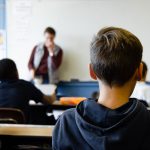Unique to UConn is the highly-interconnected nature of its DMD game design and educational technology programs. The two coordinate to target practical skills for digital age collaboration, communication, and universal design, all of which are crucial in cutting-edge entertainment, educational, and interactive business spaces. This partnership allows UConn’s game designers to learn technical skills for their profession as well as concepts related to playful learning, human cognition, and accessibility with Dr. Stephen Slota, a DMD/Neag joint faculty appointment. Likewise, educational technology specialists enrolled in the one-year Master of Arts educational technology “Two Summers” program—whose motto is “Learn to Play & Play to Learn”—benefit from interdisciplinary courses that weave together best practices for interactive storytelling, instructional design, and classroom technology implementation.
When Neag School of Education professor Doug Glanville cleaned out his garage during a recent family move, he unearthed some unusual stuff. Interspersed among the old grill equipment and lawn chairs were a dozen baseball bats, signed by Derek Jeter and other MLB stars, and beneath them a pair of Nike spikes that once belonged to Michael Jordan, during his year of professional baseball.
Kailee Ostroski is the director of operations at Connecticut Wealth Management LLC. She oversees the day-to-day operations of the firm and ensures all teammates work towards a common purpose. She leads the firm and its employees in setting clear goals that align with CTWM’s strategic vision.
“Dr. Renzulli’s lifetime of pioneering research has led to substantial, positive changes in the theory and practice of pedagogy for all.” Mensa Foundation President Charlie Steinhice said. “But what impresses me the most is his dedication to putting those ideas into action, especially for low-income students with high potential.”
With federal funding, Lisa Sanetti and colleagues will explore interventions to help reduce schoolteacher stress and improve mental well-being, with the long-term goal of retraining teachers in classrooms.
David Card has made a career of studying unintended experiments to examine economic questions — like whether raising the minimum wage causes people to lose jobs. Joshua D. Angrist and Guido W. Imbens have developed research tools that help economists use real-life situations to test big theories, like how additional education affects earnings. On Monday, their work earned them the 2021 Nobel Memorial Prize in Economic Sciences.
Aditya Birla Education Academy (ABEA), India’s leading professional development institute for teachers has partnered with the Renzulli Center for Creativity, Gifted Education, and Talent Development, University of Connecticut, US. The purpose of the collaboration is to introduce a six-week-long Schoolwide Enrichment Program for teachers. Both the prominent institutes aim at providing teachers with opportunities to learn and grow through the Schoolwide Enrichment Program.
“We want to empower the students to see the tremendous strengths they bring as member of the UConn community,” says Kenny Nienhusser, director of UConn’s La Comunidad Intelectual (LCI) learning community and a faculty member in the Higher Education and Student Affairs program. “They want a space on campus where they can reside on the same floor with people that understand them and provide them with the support they are looking for. It’s really a beautiful learning community that is a vibrant hub of happenings in the evenings and in the day when we have our seminar classes.”
The National Association for Gifted Children (NAGC) is pleased to announce the 2021 NAGC Distinguished Scholar. Each year, the association recognizes an individual who has made significant contributions to the field of gifted education and to the development of the organization for more than 10 years and a record of ongoing scholarly productivity. This year’s recipient is E. Jean Gubbins, Ph.D., Professor, University of Connecticut.
September is National Literacy Month and Deaf Awareness Month. To celebrate both occasions, we spoke with two IES-funded principal investigators about their intervention aimed at increasing the writing and language skills of students who are deaf or hard of hearing through teacher professional development targeting writing instruction and use of multilingual strategies. Together with their team, Dr. Kimberly Wolbers (University of Tennessee) and Dr. Hannah Dostal (University of Connecticut) developed Strategic and Interactive Writing Instruction (SIWI) and tested SIWI for efficacy. The team is now analyzing effects of SIWI on both student and teacher outcomes in the D/HH space.

